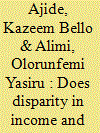|
|
|
Sort Order |
|
|
|
Items / Page
|
|
|
|
|
|
|
| Srl | Item |
| 1 |
ID:
182525


|
|
|
|
|
| Summary/Abstract |
This article compares the United States’ and China's international efforts of responding to the current coronavirus (COVID-19) pandemic and considers how the global public is receiving both to project how such measures would likely shape the international leadership competition. How do the international efforts of the United States and China on COVID-19 affect their respective soft power? How does the global public perception of the United States' and China's COVID-19 efforts affect their competitive advantage for global leadership? Based on the theory of soft power, I use Europe and Africa as cases with global perception data from the Pew Research Center (2017–2020) to argue that China would likely win some admiration for its COVID-19 efforts. However, it is unlikely to substantially shape positive global public perception of China to gain a competitive edge over the United States. This argument is based on the narrative China presents in the pandemic, its diplomatic style, and the ideational attachment the U.S. style has established. I utilize a phenomenological approach with narrative analysis.
|
|
|
|
|
|
|
|
|
|
|
|
|
|
|
|
| 2 |
ID:
182527


|
|
|
|
|
| Summary/Abstract |
The present article analyzes the debt–economic growth nexus in African countries while controlling for the impact of good governance indicators. In contrast to a long tradition of scholarship that has consistently suggested that government debt has a detrimental impact on economic growth in sub-Saharan Africa, recent studies have actually shown that government debt, when coupled with improvements in the quality of government, is actually a driver of economic growth. By analyzing an original dataset that covers the 2002–15 period and additional debt–economic growth data going up to the year 2020, we are able to suggest three conclusions. First, in the absence of debt, good governance matters in improving economic growth. Second, some dimensions of governance are better predictors of economic performance than others—as the “good enough governance” literature has in recent years suggested. Third, under no circumstances is debt government growth beneficial for the economic performance of African countries. Building on this evidence, we suggest that the COVID-19 pandemic—which has already slowed down African economies and increased their debt exposure—may prevent African countries from making greater progress along the developmental path.
|
|
|
|
|
|
|
|
|
|
|
|
|
|
|
|
| 3 |
ID:
182528


|
|
|
|
|
| Summary/Abstract |
Does disparity in income and consumption incite terrorism in Africa? To answer this important question, we investigate the empirical linkages between inequality and terrorism by separately regressing income and consumption inequalities on four indicators of terrorism: domestic, transnational, unclear, and total over the period 1980–2012. Employing a negative binomial regression across a panel dataset covering 46 African economies, the following findings are established. First, both income and consumption inequalities have decreasing impacts on all terrorism measures—with the exception of uncertain terrorism (the impact of which is negligible). Second, both income and consumption inequalities exert more statistical influence on transnational terrorism than domestic terrorism. Third, income inequality exerts more statistical weight on terrorism measures than consumption inequality across the model specifications. Last, the non-trivial impact of confounding variables—such as the lagged value of terrorism, surface areas, and conflicts—are validated across the terrorism models. In line with these empirical outcomes, policy implications and suggestions for further studies are offered.
|
|
|
|
|
|
|
|
|
|
|
|
|
|
|
|
| 4 |
ID:
182529


|
|
|
|
|
| Summary/Abstract |
This article describes and analyzes the desperate situation of Korean first-generation divided family members who are still separated from their relatives nearly 70 years since the end of the Korean War (1950–1953). I aim to provide the reader with a reasonable quantification of the problem and make projections as to this first generation's likely future survival. The elements of the approach adopted to resolve the issue of family separation by the humanitarian bodies charged with addressing the problem, the Red Cross Societies of the two Koreas are described, and suggestions are made for improvement. The reunion program's successes and failures are critically assessed as is the key role played by the Red Cross Talks in the history of inter-Korean relations. Finally, conclusions are drawn as to the practical measures which may contribute to a resolution to the problem before the final disappearance of Korea's first generation of aged, separated family members.
|
|
|
|
|
|
|
|
|
|
|
|
|
|
|
|
| 5 |
ID:
182526


|
|
|
|
|
| Summary/Abstract |
This article critically analyzes the role of confidence-building measures (CBMs) in the evolution of relations between Pakistan and India. Relations between these two nuclear-armed states remain in turmoil even after 73 years of independence. The study begins with an overview of the relations/conflicts and a brief history of diplomatic engagements between the two countries since independence from British rule in 1947. We explain the theoretical framework of CBMs by analyzing the strengths and weaknesses of the CBMs approach. Subsequently, we analyze several significant confidence-building initiatives between the two countries in various domains of bilateral relations and identify the spoilers affecting relations between the two countries. Research suggests that Pakistan and India require a comprehensive and integrated approach for CBMs in political, military, economic, environmental, and social domains to foster an environment of mutual trust and peaceful coexistence.
|
|
|
|
|
|
|
|
|
|
|
|
|
|
|
|
|
|
|
|
|